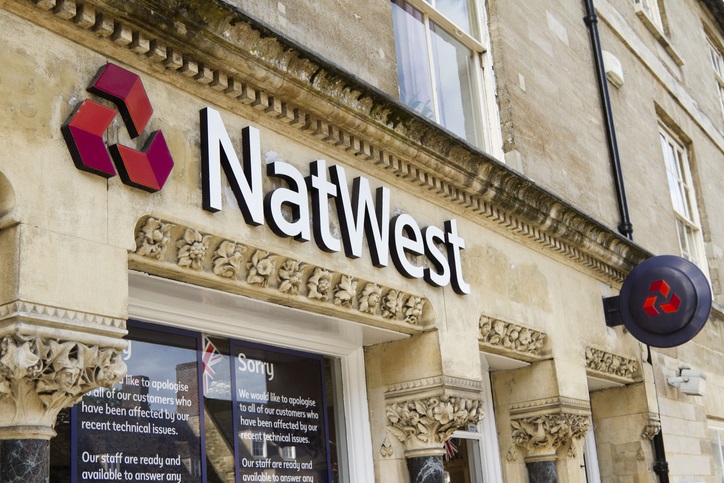NatWest takes big loss, but many are optimistic
NatWest seems increasingly well positioned to benefit from any incremental improvements in the economy.
31st July 2020 09:51
by Richard Hunter from interactive investor
NatWest seems increasingly well positioned to benefit from any incremental improvements in the economy, writes our head of markets.

The name may have changed, but the challenges unfortunately remain the same at the former Royal Bank of Scotland, recently renamed NatWest (LSE:NWG).
Caution is increasingly becoming the watchword among the banks and NatWest is no exception as it published second-quarter and half-year results. Without specific mention of the rapidly deteriorating outlook as highlighted by Lloyds Banking Group (LSE:LLOY), NatWest has nonetheless significantly increased its impairment charge from £802 million at the first quarter stage to £2.9 billion, with the full-year figure estimated to be in the region of £3.5-£4.5 billion.
Central to this thinking are the unknowns of the next few months, as government schemes fade, leaving individuals and businesses increasingly to fend for themselves, among what is likely to be a challenging economic recovery in the UK.
This is quite apart from the additional risks which Brexit might bring depending on the eventual outcome, with NatWest’s hefty exposure to the small-to-medium-sized businesses sector also contributing to a potentially toxic mix.
Another strong theme emerging from the banks at present is their desire to be seen as part of the solution to this economic crisis, as opposed to being the major cause just over a decade ago. For its part, NatWest has participated in around £10 billion of government-led lending initiatives, while providing payment holidays to approximately 300,000 customers.
In what was already an increasingly tough environment for the likes of the retailers, the pandemic has punched a hole in many other sectors, with companies large and small in dire need of funding requirements which the banks have sought to provide.
Excluding the impairment provision, NatWest made an operating profit of £2.1 billion in the first half of 2020, giving some context to the overall £770 million operating pre-tax loss.
Some of the key metrics inevitably suffered, with the Return on Tangible Equity number going negative, far away from its long-term target of a positive 9-11%, total income down 9%, a decline in Net Interest Margin to just 1.67% and a spike in the cost/income ratio to 63.8% (57.7% at the first quarter stage) as the achieved reduction in costs could quite simply not keep pace with the reduction in income.
From a wider perspective, the government stake continues to overhang the stock, although this is less of a pressing issue given the current environment, while the lack of a dividend in the immediate future detracts from the investment case for the banks generally.
Even so, NatWest is well positioned to weather the current storm.
Its capital cushion has increased again to 17.2%, from a previous 16.6%, and is one of the highest in the sector. This is underpinned by a strong liquidity position, with a pool of £243 billion and an excess ratio of 166%. The bank still expects cost savings for the year to hit £250 million and the size of the additional impairment charge implies a prudent risk approach.
Within the units, the significant UK Personal Banking division has shown promise on a number of fronts, with Return on Equity of 10.7%, a cost/income ratio of 49.2% and was also bolstered by a £250 million release on the PPI provision, given lower than anticipated claims.
Elsewhere, increased trading activity among volatile markets resulted in a spike of 44% in income for NatWest Markets.
The parlous outlook for banks amid this economic uncertainty has been largely factored in by investors, with the NatWest share price having declined 52% over the last year, as compared to a drop of 21% for the wider FTSE 100 index.
The question therefore remains where the banks can reasonably get to from here, and whether prospects will continue to be dominated by factors beyond their control. NatWest seems increasingly well positioned to benefit from any incremental improvements in the economy, with this being reflected in the market consensus of shares optimistically remaining at a ‘buy’.
Full performance can be found on the company or index summary page on the interactive investor website. Simply click on the company's or index name highlighted in the article.
These articles are provided for information purposes only. Occasionally, an opinion about whether to buy or sell a specific investment may be provided by third parties. The content is not intended to be a personal recommendation to buy or sell any financial instrument or product, or to adopt any investment strategy as it is not provided based on an assessment of your investing knowledge and experience, your financial situation or your investment objectives. The value of your investments, and the income derived from them, may go down as well as up. You may not get back all the money that you invest. The investments referred to in this article may not be suitable for all investors, and if in doubt, an investor should seek advice from a qualified investment adviser.
Full performance can be found on the company or index summary page on the interactive investor website. Simply click on the company's or index name highlighted in the article.